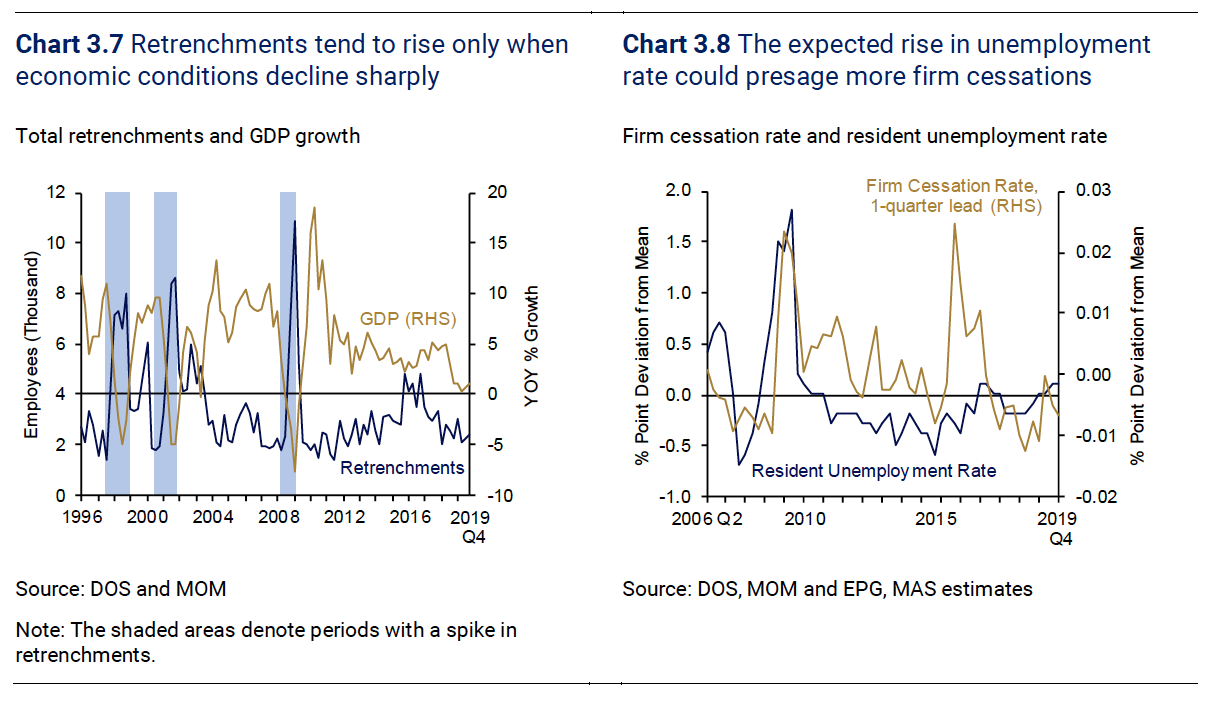share on
It’s not news that COVID-19 is significantly affecting the world. We’ve read about its impact on job outlooks, and even its impact on HR practices.
However, the Monetary Authority of Singapore’s (MAS) latest report, Macroeconomic Review Volume XIX Issue 1, Apr 2020, provides an assessment of Singapore’s economic developments, and delves into the outbreak’s near- and long-term effect on both the economy and labour market.
A summary of the key points impacting employment is found below:
Wage cuts and reduced hours more common actions considered
Wages, rather than employment, will bear the brunt of the negative shock of the outbreak in the near term, the MAS stated.
“As revenues shrink, firms are likely to reduce labour costs via a combination of reductions to wages and headcount. Notwithstanding the government’s support measures, some firms affected by the fallout from COVID-19 may still have to undertake labour cost adjustment measures such as putting workers on shorter workweeks or no-pay leave.”
The reason for this could be because wage subsidies and other support measures taken may still be insufficient to cover revenue losses for some firms, it added. Some may even take the alternate route and ask their employees to take pay-cuts, while a decline in overall remuneration in some sectors could also occur through reductions in bonuses.
Overall, should government subsidies be insufficient to offset business losses, both shorter working hours and pay reductions were found to likely occur in the first instance. In fact, in a recent survey by Mercer Singapore, cited in the MAS report, 3% of firms surveyed have already cut their staff salaries, while another 5% were considering doing so; on the other hand, a lower 1% were contemplating retrenchments – what’s being urged as a last resort by the government.
Industries most likely to see wage decline: Transportation & storage, financial services
Industry-level forecasts shown in the report revealed nominal wage declines are likely to occur “swiftly and sharply” in the transportation & storage and financial services industries, where it explained remuneration is “highly responsive to changes in business cycle conditions.” The transformation & food services industry is also expected to be the most heavily impacted by containment measures in the country, while the financial services industries will contribute significantly to overall wage declines for 2020.
At the same time, the accommodation & food services industry is expected to see significant monthly wage declines, driven by reductions in hours worked; while, like the financial services, the community, social & personal services (CSP) will also contribute significantly to overall wage declines for 2020, given the high variable components in their remuneration.
That said, elevated demand for healthcare workers and increased bonuses given by the government to the healthcare sector should provide some support to wages in the CSP sector, the report added.
Retrenchments not off the cards
In spite of the above, notwithstanding financial support from the government, as well as labour market adjustments on the intensive front, the “large, abrupt shock to the Singapore economy” is still likely to result in retrenchments and a rise in unemployment.

The report explained: “This non-linearity in the response of retrenchments to economic weakness occurs because of the cost of hiring and training workers. A more severe downturn is more likely to cause worker productivity to fall below these costs and thus result in an increase in separations.
“Similar to previous downturns, firms that were already in a weak financial position before the COVID-19 outbreak are more likely to retrench.”
Hiring intentions have fallen, but employment will grow in sectors such as construction and healthcare
When it comes to hiring, surveys cited in the report show that hiring intentions have fallen sharply, amid heightened uncertainty.
For instance, the sub-index for employment in the Singapore Commercial Credit Bureau’s Business Optimism Index points to a contraction in Q2 2020, as all sectors surveyed expect headcount to be either frozen or reduced.
Further, a survey by Mercer Singapore in March showed that more than one-fifth of the 232 companies surveyed will not hire to replace attrition this year, while slightly more than half expect to hire for replacements only.
While this is so, the report added that headcount is expected to “discernibly expand” in a few industries such as healthcare, construction, and public administration & education, largely due to ongoing public infrastructure projects and government measures such as the SGUnited Jobs initiative.
Photo / 123RF
Infographic / MAS
Human Resources Online is on Telegram! Follow us @humanresourcesonline or click here for all the latest HR and manpower news from around the region.
share on
Follow us on Telegram and on Instagram @humanresourcesonline for all the latest HR and manpower news from around the region!
Related topics


